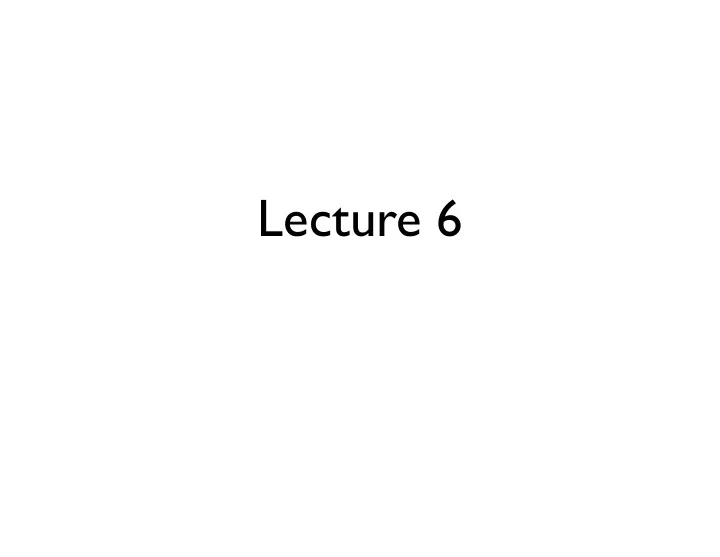

Lecture 6
The Acceptance Problem for TMs A TM = { <M,w> | M is a TM & w ∈ L(M) } Theorem: A TM is Turing recognizable Pf: It is recognized by a TM U that, on input <M,w>, simulates M on w step by step. U accepts iff M does. ☐ U is called a Universal Turing Machine (Ancestor of the stored-program computer) Note that U is a recognizer, not a decider.
A TM is Undecidable A TM = { <M,w> | M is a TM & w ∈ L(M) } Suppose it’s decidable, say by TM H. Build a new TM D: “on input <M> (a TM), run H on <M,<M>>; when it halts, halt & do the opposite, i.e. accept if H rejects and vice versa” D accepts <M> iff H rejects <M,<M>> (by construction) iff M rejects <M> (H recognizes A TM ) D accepts <D> iff D rejects <D> (special case) Contradiction!
A specific non-Turing- Note: The above TM D, if it existed, would recognize recognizable language exactly the language L D defined in this diagonalization proof Let M i be the TM (which we already know is w 1 w 2 w 3 w 4 w 5 w 6 encoded by w i , i.e. 1 <M 1 > 0 0 0 0 0 0 <M i > = w i not recognizable) <M 2 > 1 1 1 1 1 1 (M i = some default machine, if <M 3 > 0 1 0 1 0 1 ... w i is an illegal code.) <M 4 > 0 1 0 0 0 0 <M 5 > 1 1 1 0 0 0 i, j entry tells whether <M 6 > 0 1 0 0 0 1 M i accepts w j . . . . . Then L D is not recognized . by any TM L D 1 0 1 1 1 0 ...
⊂ Decidable Recognizable ≠ co- recognizable recognizable L D L D decidable
Decidable = Rec ∩ co-Rec L decidable iff both L & L c are recognizable Pf: co- ( ⇐ ) on any given input, dovetail recognizable recognizable a recognizer for L with one for L c ; one or the other must halt & accept, so you can halt & accept/reject appropriately. decidable ( ⇒ ): from last lecture, decidable languages are closed under complement (flip acc/rej)
Reduction “A is reducible to B” means I could solve A if I had a subroutine for B Ex: Finding the max element in a list is reducible to sorting pf: sort the list in increasing order, take the last element (A big hammer for a small problem, but never mind...)
The Halting Problem HALT TM = { <M,W> | TM M halts on input w } Theorem: The halting problem is undecidable Proof: A = A TM , B = HALT TM Suppose I can reduce A to B. We already know A is undecidable, so must be that B is, too. Suppose TM R decides HALT TM . Consider S: On input <M,w>, run R on it. If it rejects, halt & reject; if it accepts, run M on w; accept/reject as it does. Then S decides A TM , which is impossible. R can’t exist.
Recommend
More recommend